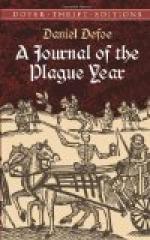This leads me again to mention the time when the plague first began,[254] that is to say, when it became certain that it would spread over the whole town, when, as I have said, the better sort of people first took the alarm, and began to hurry themselves out of town. It was true, as I observed in its place, that the throng was so great, and the coaches, horses, wagons, and carts were so many, driving and dragging the people away, that it looked as if all the city was running away; and had any regulations been published that had been terrifying at that time, especially such as would pretend to dispose of the people otherwise than they would dispose of themselves, it would have put both the city and suburbs into the utmost confusion.
The magistrates wisely caused the people to be encouraged, made very good by-laws[255] for the regulating the citizens, keeping good order in the streets, and making everything as eligible as possible to all sorts of people.
In the first place, the lord mayor and the sheriffs,[256] the court of aldermen, and a certain number of the common councilmen, or their deputies, came to a resolution, and published it; viz., that they would not quit the city themselves, but that they would be always at hand for the preserving good order in every place, and for doing justice on all occasions, as also for the distributing the public charity to the poor, and, in a word, for the doing the duty and discharging the trust reposed in them by the citizens, to the utmost of their power.
In pursuance of these orders, the lord mayor, sheriffs, etc., held councils every day, more or less, for making such dispositions as they found needful for preserving the civil peace; and though they used the people with all possible gentleness and clemency, yet all manner of presumptuous rogues, such as thieves, housebreakers, plunderers of the dead or of the sick, were duly punished; and several declarations were continually published by the lord mayor and court of aldermen against such.
Also all constables and churchwardens were enjoined to stay in the city upon severe penalties, or to depute such able and sufficient housekeepers as the deputy aldermen or common councilmen of the precinct should approve, and for whom they should give security, and also security, in case of mortality, that they would forthwith constitute other constables in their stead.




